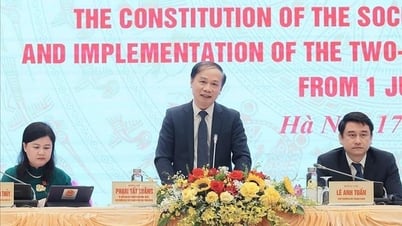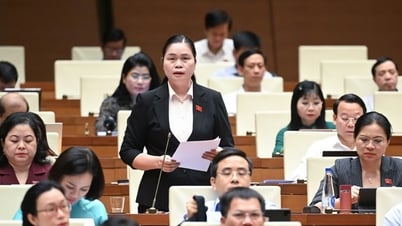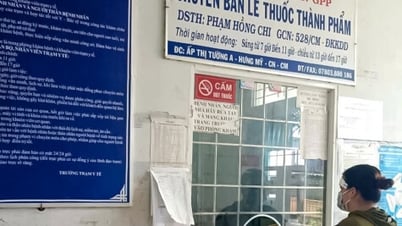The State Bank of Vietnam (SBV) has just submitted to the Government a draft Decree on a controlled testing mechanism (sandbox) for financial technology (fintech) activities in the banking sector. Meanwhile, many fintech companies providing online loans and peer-to-peer lending (P2P Lending) said they are "waiting" for the decree to be issued because this field lacks a clear legal framework, causing the market to be ambiguous, and black credit disguised as lending via apps is rampant everywhere.
Facing difficulties due to lack of legal framework
In fact, in just a short time, local police have eliminated dozens of black credit lending apps with high interest rates and terrorist debt collection. Ho Chi Minh City police have repeatedly warned about the sophisticated tricks of credit that are disguised as lending money through apps with advertisements such as: no mortgage required, no proof of income required, quick disbursement... while being vague about interest rates and fees or borrowers must agree to let these apps access their phone contacts, personal photos, and collect personal information to be disbursed. Meanwhile, legitimate fintech lending companies are implicated, misunderstood as black credit... due to the lack of a clear legal framework.

Due to the lack of clear legal regulations, it is difficult for people who need to borrow money to distinguish between licensed lending apps and black credit in disguise. Photo: HOANG TRIEU
Mr. Do Minh Hai, General Director of ATM Online Company, said that the company provides small loans from 2 million to 20 million VND via online channels. Borrowers are substandard customers of banks and financial companies, people who have little or no access to financial products and services, people living in rural areas, and people with low incomes.
"Financial support activities for this customer segment are part of the national comprehensive financial strategy. However, to date, the legal framework for credit granting activities on a technology platform has not been issued in any document (except for fintech activities in the payment intermediary sector regulated by the State Bank in a number of documents). Fintech activities have not been regulated in accordance with any enterprise model in the Enterprise Law and have not been classified as business lines according to the Investment Law" - Mr. Hai cited.
Even in the list of economic sector codes according to Decision No. 27/2018/QD-TTg dated July 2018 on promulgating the Vietnamese economic sector system, there is no list of sector codes for industries in the fintech field. Fintech activities that are developing popularly in some countries around the world such as peer-to-peer lending, blockchain technology application... have appeared in Vietnam but there are no official legal regulations.
Mr. Purtov Kirill - Director of Lendtop Company, owner of the MoneyCat lending platform - also commented that consumer credit is an indispensable activity and an effective support channel because many people need to borrow capital for short-term spending. In 2022, consumer lending increased by 21.9% compared to 2021, showing that the market demand is very large.
Meanwhile, the Decree on pilot lending mechanism for fintech in the banking sector has been soliciting opinions for a while but there is still no official information about its issuance. This is causing many difficulties for units operating in the fintech sector such as Lendtop.
"Recently, some registered lending companies have also been inspected by the police, negatively affecting the image of the company, even being misunderstood as black credit. Debt collection activities of serious lending companies are facing difficulties when customers refuse to pay their debts; even fintech companies have no protection against scammers" - Mr. Purtov Kirill said.
Level the playing field
The CEO of an online lending company said that millions of people need to borrow money but have not been able to access official credit channels from banks and financial companies because they do not meet the standards. They often turn to fintech companies, P2P Lending and even black credit to borrow. Without a legal framework for online lending, it is difficult for customers to distinguish between licensed businesses and black credit in disguise.
In fact, many developed countries have established common rules for the entire market to reduce black credit, including building a legal framework such as a sandbox for fintech in the banking sector. Mr. Do Minh Hai proposed to soon issue a decree for the sandbox to facilitate the operation of fintech companies, helping everyone to have full access to quality financial services, in accordance with the standards and conditions of customers.
"At the same time, there should be regulations requiring fintech companies to be certified and use the services of the National Credit Information Center (CIC) to prevent customers from being overloaded with loans, that is, one person borrowing multiple loans at the same time from different units," Mr. Purtov Kirill suggested.
Also related to the need for a sandbox regulation for fintech, a group of experts from the University of Economics and Law, VNU-HCM has conducted research on this topic. Talking to reporters of the Lao Dong Newspaper, Associate Professor, Dr. Tran Huynh Son, representative of the research group, said that in Vietnam, the emergence of new business models in the financial sector such as peer-to-peer lending, new payment models, etc. do not have specific legal regulations to regulate.
The draft Decree on sandbox for fintech in Vietnam only focuses on fintech solutions in the banking sector such as technology-based credit granting; credit scoring; peer-to-peer lending... while fintech solutions that may be related to many other activities such as securities and insurance have not been taken into account.
The draft also does not have a mechanism to encourage fintech companies to participate in testing and those who do not participate, such as if fintech does not participate in the testing mechanism, their operations will be limited or the official operating license will be extended, the evaluation standards will be stricter... "There needs to be a common policy framework on sandboxes for all sectors. This will help businesses save time when applying for testing permits and management agencies will not waste time establishing a legal framework" - Associate Professor, Dr. Tran Hung Son expressed his opinion.
Necessary conditions
Economist - Dr. Dinh The Hien said that it is necessary to calculate and consider carefully when issuing a Decree on sandbox for fintech in the banking sector. In China, peer-to-peer lending used to develop very strongly but then due to loose control, it led to consequences. This lending segment is successful in the US thanks to the popular and developed personal credit scoring system; the personal credit score of each customer is clear, transparent and can be controlled by the management agency. Meanwhile, in Vietnam, the personal credit scoring system is still not really developed and has not been fully statistically recorded.
Source

































































































Comment (0)